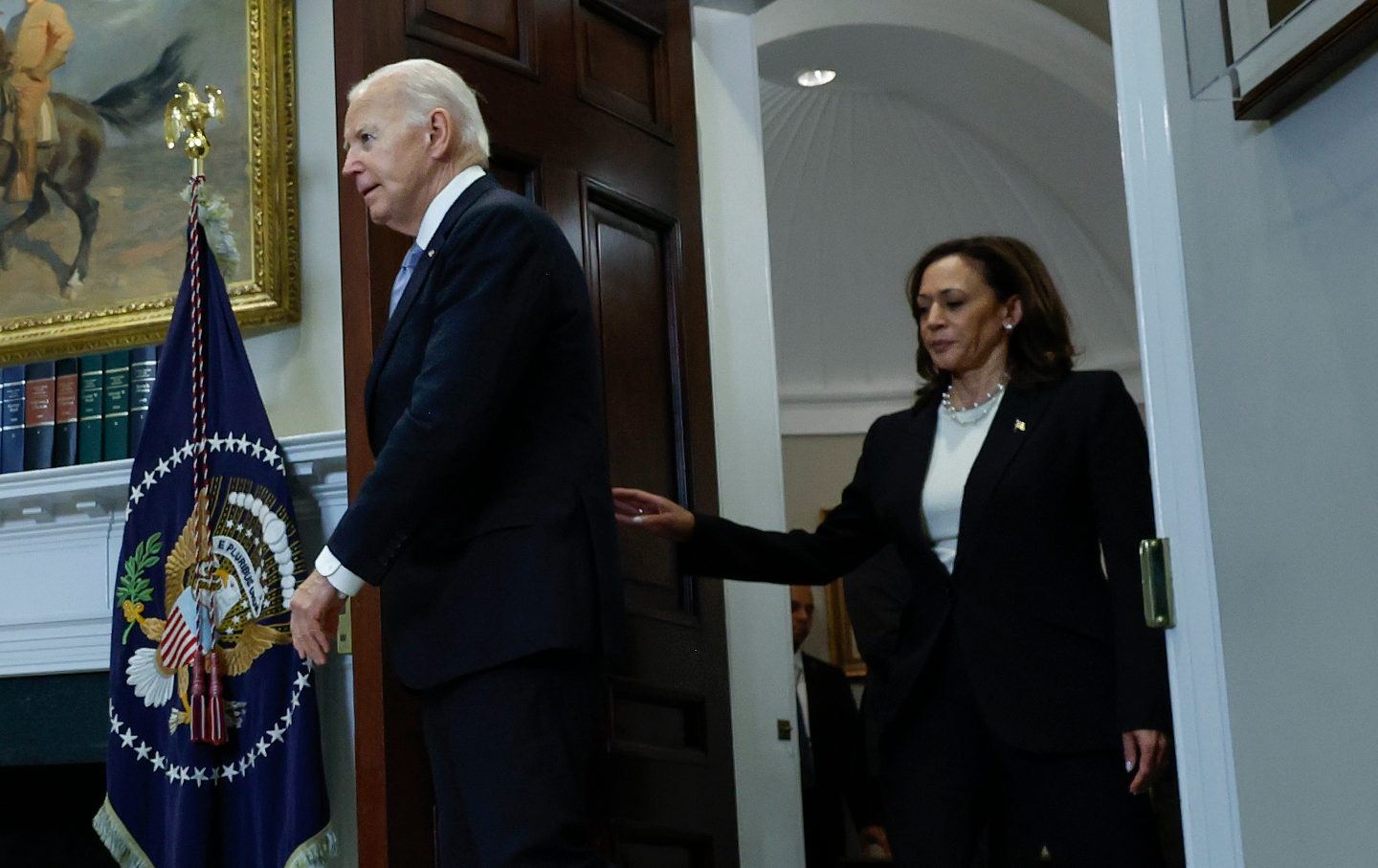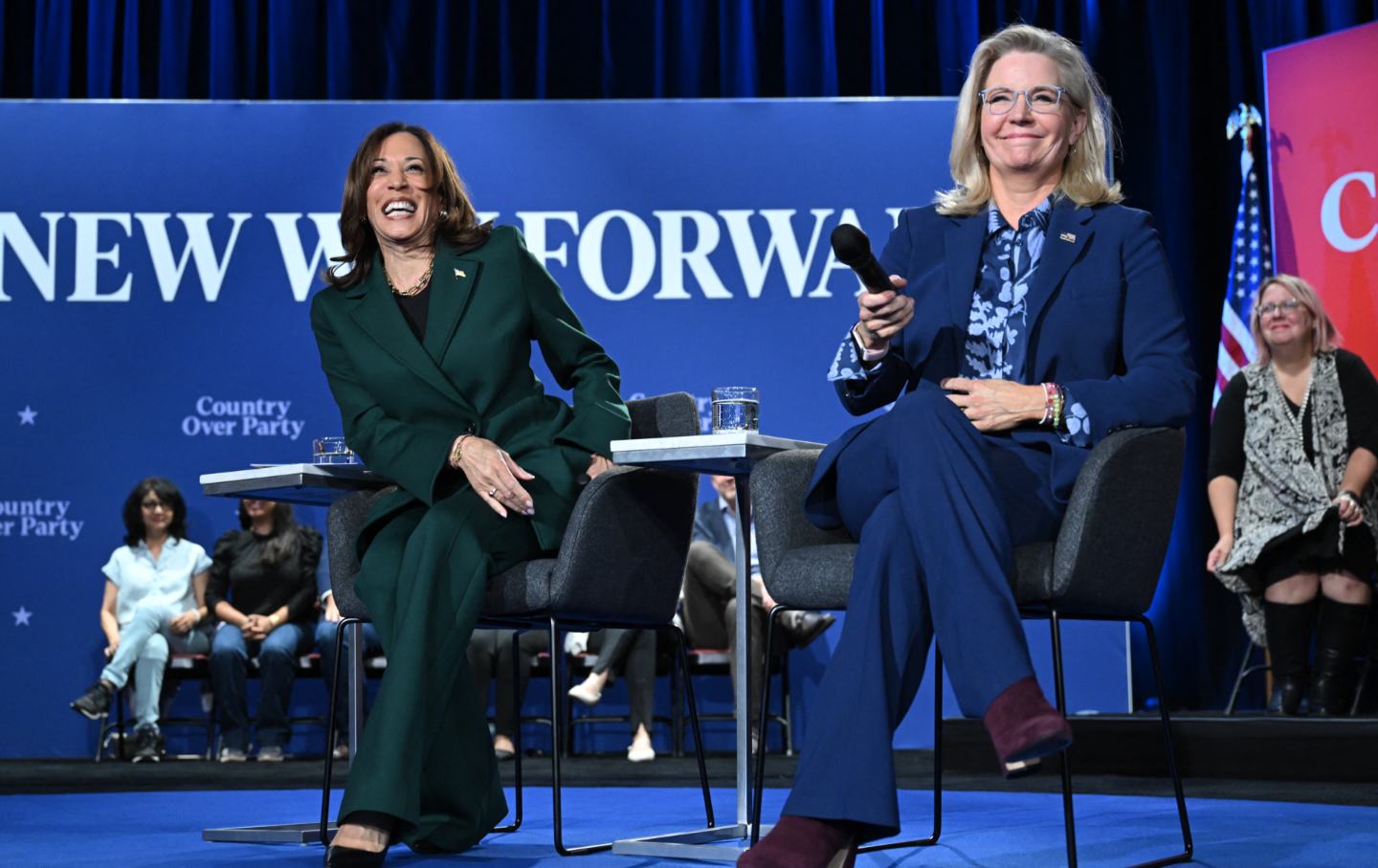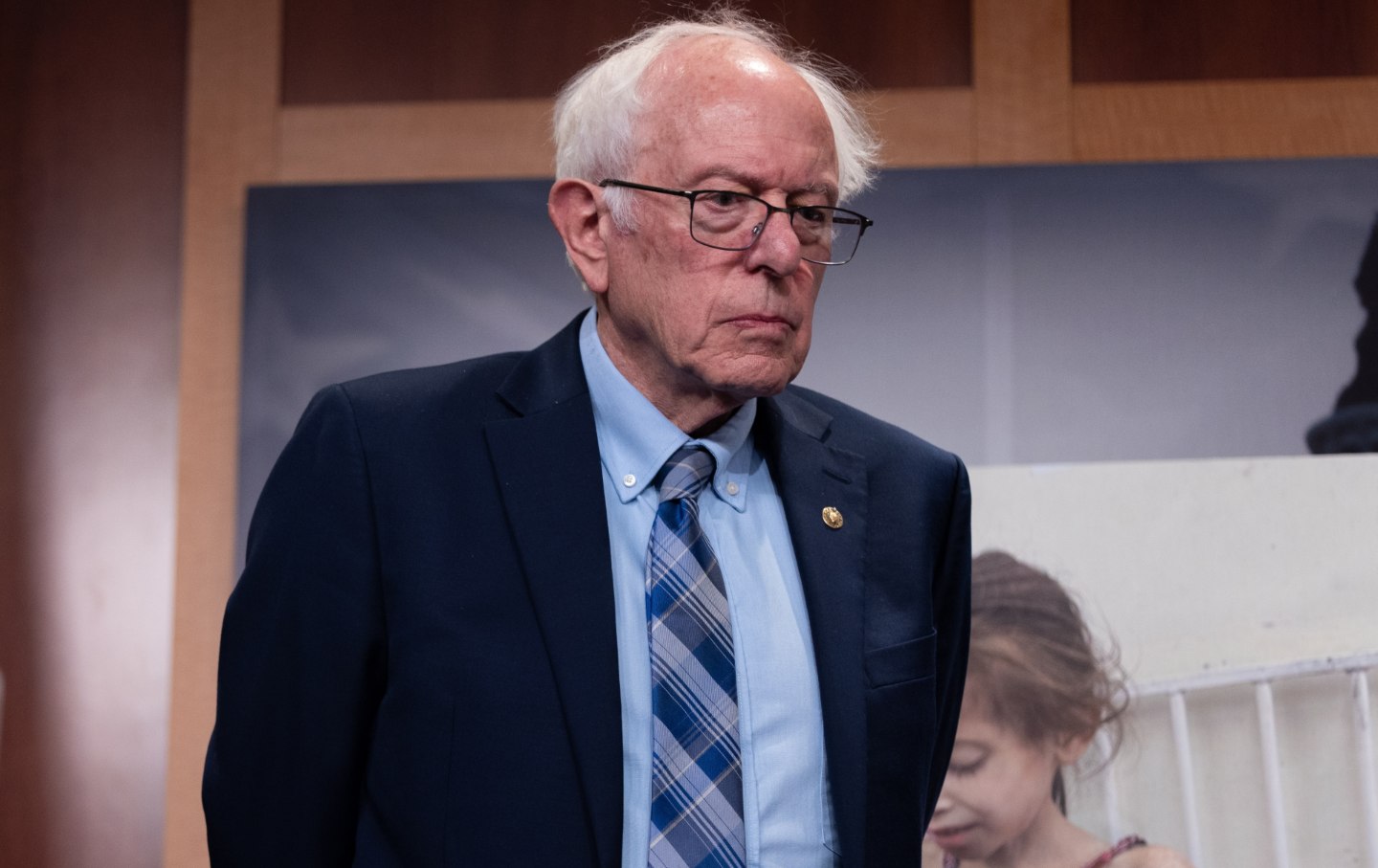I Left Biden’s Campaign Over Gaza. Here’s How Harris Can Earn My Trust Again.
The president’s foreign policy choices in the Middle East and Ukraine have been disasters. Harris needs to make a decisive break.

Joe Biden and Kamala Harris at the White House on July 14, 2024.
(Mandel Ngan / AFP via Getty Images)Last November, I stopped participating in President Joe Biden’s national finance committee because I could no longer support his feckless approach to ending the war in the Gaza Strip, where Israel continues to use US weapons every day to kill innocent women and children. Now that Biden has stepped aside, I’m cautiously optimistic that Vice President Kamala Harris and her running mate, Minnesota Governor Tim Walz, have the political space and resolve to do what Joe Biden could not: make a fundamental course correction in how the US is managing dueling crises in Ukraine and Gaza.
The need for such a shift could not be more urgent. Israel’s reckless decision to assassinate Hamas political leader Ismail Haniyeh in Iran and Hezbollah commander Fuad Shukr in Lebanon has brought the region to the brink of a massive regional war, a war that is all too likely to drag US soldiers into yet another Middle East conflict.
I speak from experience when I say that Biden’s approach to the two wars has weakened America and brought the world closer to the kind of metastasizing global conflict we have all long feared. I spent much of the past few years as a frontline humanitarian worker in Afghanistan, Ukraine, and the Middle East trying—sometimes in vain—to rescue desperate families from the fatal consequences of Biden’s decisions.
The shortfalls in Biden’s conventional foreign policy approach emerged just a few months into his term with the poorly planned and unnecessarily chaotic withdrawal of American forces from Afghanistan.
As Kabul fell in August 2021, I flew to Afghanistan to help hundreds of panicked Afghans escape Taliban rule, even after the last US soldiers left without fulfilling Washington’s pledge to protect those who had helped America.
If lessons were taken from the poorly executed Afghanistan withdrawal, it’s unclear what they were.
I was an early champion of Biden’s steadfast support for Ukraine President Volodymyr Zelenskyy (I’ve personally provided over $50 million in direct humanitarian aid to civilians in Ukraine) and his role in convening the global coalition of allies providing Kyiv with the weapons and support its leaders need to triumph over Russian President Vladimir Putin. He was right to back Ukraine, and I think that decision will be seen as his biggest foreign policy achievement.
But the same lack of strategic clarity I witnessed in Afghanistan became apparent the longer the Ukraine war went on. Two-and-a-half years later, I’ve lost more Ukrainian friends than I can count. And while the US has spent nearly $175 billion on a policy that helped Ukraine beat back Russian advances, the strategy now appears to be to support a bloody quagmire with no military or diplomatic resolution to the conflict in sight. Ukraine’s current incursion into Russia serves as further proof of its capabilities. However, it will do little to fundamentally change the tide of the war unless the administration can finally bring itself to do what it takes to send the Russians back home.
We must ask for more of Harris. She and Walz still face an uphill battle against Trump, and preventing his return to the White House will require the vice president to do more than develop viral memes and “Brat”-era branding. To win back disillusioned voters like me this November, Harris needs to make a decisive break with Biden’s foreign policy and chart a new path for the United States as a morally grounded global leader, especially in the Middle East and Ukraine.
Part of this break has to include changing tack on Gaza. The war there galvanized American students in a way unseen since the anti-apartheid movement of the 1980s. Biden’s unconditional backing of Israel sapped his support among demoralized voters like me who expected a baseline respect for international law and innocent civilian lives. Biden’s “bear hug” strategy towards Prime Minister Benjamin Netanyahu’s government failed to deter Israel from inching toward a regional war or from continuing to kill innocent Palestinian women and children by the thousands.
Almost every day, I receive imploring messages from doctors working inside Gaza asking me to help them get critically injured children out—or life-saving medicine in. Biden’s approach—mild criticism mixed with near-ceaseless military support—has been completely ineffective.
I still have nightmares about those I haven’t been able to save. Early in the war, I worked on getting a 24-year-old mother named Layla, and her infant daughter, Alia, out of Gaza. Layla was killed in an air strike 10 days into the war. We worked around the clock with various officials to try to secure permission to get Alia out of Gaza. But another Israeli airstrike killed Alia before we could get her to safety.
Meanwhile, US military aid drops and sea runs were no substitute for the simple solution to end a slow-motion genocide: Compelling Israel to open its borders again to allow thousands of aid trucks to drive into Gaza.
Harris’s remarks following a July 25 meeting with Netanyahu offered hope for those of us seeking a more active US role in ending the conflict and preventing a regional war. She centered the suffering of Palestinians and rejected Netanyahu’s claim made earlier that day that Israel “must retain overriding security control [in Gaza],” saying that a ceasefire and hostage deal would require “a withdrawal of the Israeli military from population centers in Gaza.”
Harris needs to build on those words and start moving the needle now. She can join forces with US officials and throughout the Biden administration who are quietly trying in vain to persuade the president and his top advisers to take a tougher stand with Netanyahu. She can stop relying on the policy prescriptions of a small group of Beltway think tanks stacked with former officials eager to defend their failed policies and maintain their financial support from weapons companies and foreign governments. And she can press for the Biden administration to impose an arms embargo on Israel, demand that Netanyahu engage in good faith with ceasefire negotiations, and resume funding the United Nations Relief and Works Agency for Palestine, which Israel has baselessly accused of collaborating with Hamas.
The vice president already struck the right tone after meeting Netanyahu, but now is the time for Harris to start making sure her actions match her words.
Popular
“swipe left below to view more authors”Swipe →Taking a clear moral stand now—backed by concrete steps laying out how she would lead the nation in a new direction—would allow Harris to reenergize support among voters likely to decide the outcome of the presidential race. Harris needs to regain their trust if she hopes to build a winning coalition in key states this November.
We cannot back down
We now confront a second Trump presidency.
There’s not a moment to lose. We must harness our fears, our grief, and yes, our anger, to resist the dangerous policies Donald Trump will unleash on our country. We rededicate ourselves to our role as journalists and writers of principle and conscience.
Today, we also steel ourselves for the fight ahead. It will demand a fearless spirit, an informed mind, wise analysis, and humane resistance. We face the enactment of Project 2025, a far-right supreme court, political authoritarianism, increasing inequality and record homelessness, a looming climate crisis, and conflicts abroad. The Nation will expose and propose, nurture investigative reporting, and stand together as a community to keep hope and possibility alive. The Nation’s work will continue—as it has in good and not-so-good times—to develop alternative ideas and visions, to deepen our mission of truth-telling and deep reporting, and to further solidarity in a nation divided.
Armed with a remarkable 160 years of bold, independent journalism, our mandate today remains the same as when abolitionists first founded The Nation—to uphold the principles of democracy and freedom, serve as a beacon through the darkest days of resistance, and to envision and struggle for a brighter future.
The day is dark, the forces arrayed are tenacious, but as the late Nation editorial board member Toni Morrison wrote “No! This is precisely the time when artists go to work. There is no time for despair, no place for self-pity, no need for silence, no room for fear. We speak, we write, we do language. That is how civilizations heal.”
I urge you to stand with The Nation and donate today.
Onwards,
Katrina vanden Heuvel
Editorial Director and Publisher, The Nation
More from The Nation

How Loyalty Trumps Qualification in Trump Universe How Loyalty Trumps Qualification in Trump Universe
Meet “first buddy” Elon Musk.

Bury the #Resistance, Once and For All Bury the #Resistance, Once and For All
It had a bad run, and now it’s over. Let’s move on and find a new way to fight the right.

Trans People Shouldn’t Be Scapegoated for Democrats’ Failures Trans People Shouldn’t Be Scapegoated for Democrats’ Failures
Politicians and pundits are stoking a backlash to trans rights in the wake of the election. They’re playing a dangerous game.

Bernie Sanders Is Leading a Bold New Effort to Block Arms Sales to Israel Bernie Sanders Is Leading a Bold New Effort to Block Arms Sales to Israel
The senator has more allies than ever in his fight to hold Israel accountable and save lives in Gaza.

Will “Serious” Republicans Block Any of Trump’s Freak-Show Cabinet Picks? Will “Serious” Republicans Block Any of Trump’s Freak-Show Cabinet Picks?
Will they stand up to even the scariest of these nominees? I’m not optimistic.

Harris’s Gaza Policy Was a Disaster on Every Level Harris’s Gaza Policy Was a Disaster on Every Level
Palestine may not have swung the election one way or another. But Democrats unquestionably paid a high price for their refusal to hold Israel accountable.


